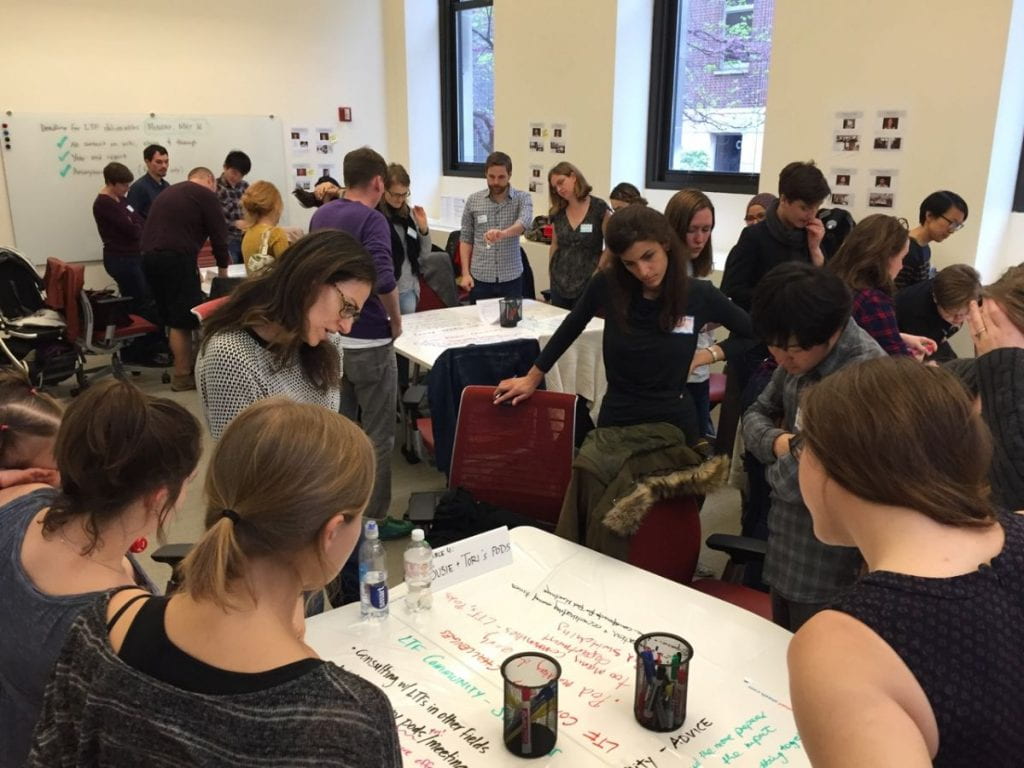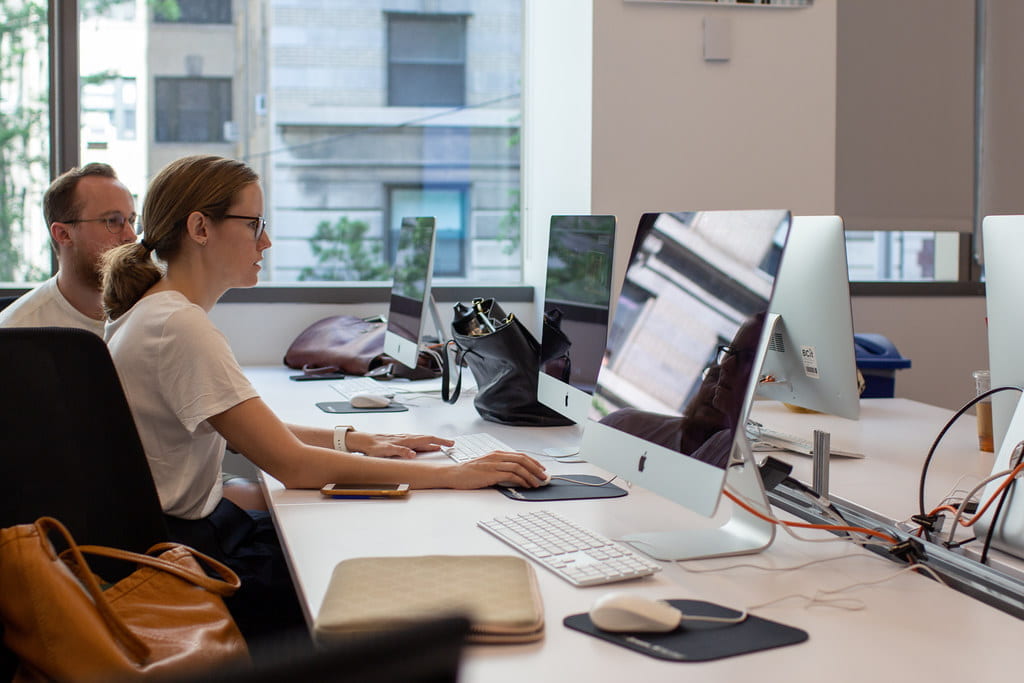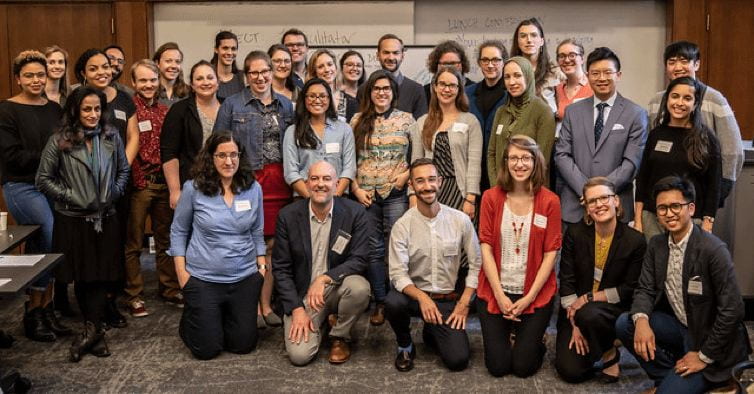This Week for Graduate Students: Last day to apply for Lead Teaching Fellowship! And see upcoming offerings
Lead Teaching Fellowship
 The Lead Teaching Fellowship is a paid professional development opportunity for doctoral and MFA students who are committed to promoting pedagogical practices and conversations among their peers. This fellowship is available to doctoral students in all schools at Columbia University in years 2–7 in their program as of Fall 2022, as well as MFA students in the School of the Arts. 2022-23 Lead Teaching Fellow applications must be submitted before midnight on April 4.
The Lead Teaching Fellowship is a paid professional development opportunity for doctoral and MFA students who are committed to promoting pedagogical practices and conversations among their peers. This fellowship is available to doctoral students in all schools at Columbia University in years 2–7 in their program as of Fall 2022, as well as MFA students in the School of the Arts. 2022-23 Lead Teaching Fellow applications must be submitted before midnight on April 4.
If you have questions about applying and/or this fellowship, we invite you to reach out to CTL at CTLgrads@columbia.edu.
Teachers’ Lounge: Intercultural Pedagogy – Student Perspectives
In this special Teachers’ Lounge, undergraduates from the International Student Advisory Board and CTL’s Students as Pedagogical Partners program will discuss their experiences as learners in US classrooms. This informal conversation may well help you identify practices going forward that can make a big difference in making students from various cultural backgrounds comfortable in your sections or courses.
Date & Time: Thursday, April 7, 12:10 – 1:25 pm
Location: 212 Butler Library
Register: Register here
Teachers’ Lounge sessions count as pedagogy workshops in the Teaching Development Program (TDP)
Assessing Teaching and Learning Seminar (ATLS)
 The Assessing Teaching & Learning Seminar (ATLS) is an online seminar offered by the CTL to help participants create a plan to assess teaching and student learning in the classroom. Participants gain an understanding of Teaching as Research (TaR) by defining an original research question and developing their own TaR project proposal, drawing on the support of an online community of peers and the instructor.
The Assessing Teaching & Learning Seminar (ATLS) is an online seminar offered by the CTL to help participants create a plan to assess teaching and student learning in the classroom. Participants gain an understanding of Teaching as Research (TaR) by defining an original research question and developing their own TaR project proposal, drawing on the support of an online community of peers and the instructor.
Along the way they learn about relevant data collection and assessment tools, both quantitative and qualitative, and complete a methods and data analysis section. The seminar culminates in the presentation of fully developed TaR proposals.
ATLS is running from May 16 – July 1, 2022. CTL is accepting applications through April 26, and will announce acceptance to the semester no later than April 29. Send any questions about applying to ATLS to CTLgrads@columbia.edu.
This program satisfies the Advanced Track seminar requirement in the Teaching Development Program (TDP)
2022 Ivy+ Teaching Transformations Summit
A special opportunity open to current and former CTL Fellows
 Since 2017, CTLs within the Ivy+ community have partnered to produce a one-day event for graduate students invested in changing the culture of teaching in higher education. The 2022 Ivy+ Teaching Transformations Summit will run online, bringing together graduate students committed to teaching and educational development from research universities across the country.
Since 2017, CTLs within the Ivy+ community have partnered to produce a one-day event for graduate students invested in changing the culture of teaching in higher education. The 2022 Ivy+ Teaching Transformations Summit will run online, bringing together graduate students committed to teaching and educational development from research universities across the country.
During Teaching Transformations, you’ll be able to connect with colleagues about pressing questions and topics in teaching and learning in higher ed. The main event will be unconference-style discussions, where you will get to determine the shape and direction of your conversations, based on the concerns and passions you bring to the table. You’ll emerge from the experience with new ideas and an expanded perspective of what’s possible in higher education more broadly.
Open to: Current and former CTL Fellows (LTFs, TOFs, TAFs, FAAs, Teaching Consultants)
Date & Time: Friday, May 6, 12:00 – 3:00 pm
Location: Zoom
Upcoming LTF Events
The 49 2021-22 Lead Teaching Fellows are running workshops and discussions in departments all around Columbia. These are generally advertised locally. Below are upcoming events that are open to participants beyond the LTF’s home department.
LTF events count towards track completion in the Teaching Development Program.
Giving and Receiving Feedback in a Mentoring Relationship
Feedback is a key part of mentoring relationships, whether we’re talking about teaching, research, business, or any other skill. Effective feedback is empowering; it cultivates confidence and helps the mentee overcome obstacles. On the other hand, poor or inappropriate feedback can be the most hindering obstacle a mentee can face. If expectations aren’t communicated well up front, or conversations about unmet expectations go poorly, it can have severe consequences for the mentee’s work and their mental health. In this workshop, we will learn that the best mentoring relationships involve both the mentor and the mentee giving and receiving feedback from each other. We’ll talk about principles that improve the way we set expectations and give feedback in a mentoring relationship, and how you as a mentee can advocate for your needs to your mentor.
This event is led by Lead Teaching Fellow Dallin Dressman (Pharmacology). It is open to all graduate students, regardless of discipline.
Date & Time: Tue, April 5, 4pm – 5pm
Location: Zoom
Register: Email LTF Dallin Dressman at dd2842@cumc.columbia.edu
Alternative Workshop Models
Certain established workshop practices, such as the cone of silence, create an imbalance of power in the classroom—they decenter the author, hand over power to the majority, and silence the author in ways that can be profoundly damaging. In this conversation we will trace these practices to their roots at the Iowa Writer’s Workshop with the help of selected excerpts from Workshops of Empire by Eric Bennett; we will excavate these roots and examine them so that we can make informed decisions in regards to perpetuating these traditions in our own practice. Through an intensive discussion of alternative models of workshopping, with an emphasis on modified CRP (Critical Response Process, established by Liz Lerman and outlined in Matthew Salesses’ book Craft in the Real World), we will consider ways to facilitate more constructive approaches to workshopping tailored to the needs of each writer. By working through example scenarios, we will come up with new ways to give writers agency in the workshop setting and learn to shift the power dynamic towards one that centers the author so that they may leave the classroom with a desire to write more rather than less.
This event is led by Lead Teaching Fellow Anna Schwartzman (Writing). It is open to all graduate students, regardless of discipline.
Date & Time: Thu, April 7, 5pm – 6pm
Location: Dodge Hall (Room TBD)
Register: Email LTF Anna Schwartzman at a.schwartzman@columbia.edu
What do we talk about when we talk about student engagement?
We will focus on engagement within the framework of active learning in order to provide both a theoretical and a practical approach to the challenge of creating significant learning experiences intentionally and productively.
The two main objectives of this event are to discuss and implement the core concepts that are fundamental to active learning; and to carry out a hands-on activity for participants to design an activity focused on student engagement that they will effectively be able to put in place in their classes. Thus, the event will be a combination of presentation and discussion.
This event is led by Lead Teaching Fellow Tamara Hache (LAIC). It is open to all graduate students, regardless of discipline.
Date & Time: Fri, April 8, 11:00am – 12:30pm
Location: 612 W 116th St.
Register: Email LTF Tamara Hache at th2751@columbia.edu
From “On Screen” to “Face-to-Face”—Online Tools for a More Inclusive In-Person Classroom
Online learning has probably been one of the most hated consequences of the pandemic, by both teachers and students. However, it has indisputably changed our way of thinking about learning. Despite the many technical difficulties, online learning in fact allows people who are not able to physically join the classroom space to learn. Moreover, its intrinsic flexibility can be helpful in many ways to both students and teachers. In light of this, can online learning be considered inclusive? What can we learn from it to make our in-person classes more inclusive?
This workshop will deal with these questions in the attempt to figure out how to reconcile online and in-person teaching practices. The participants will leave with a better sense of what online learning still has to offer.
This event is led by Lead Teaching Fellow Valeria Spacciante (Classics). It is open to all graduate students, regardless of discipline.
Date & Time: Mon, April 11, 11:30am – 1:00pm
Location: Hamilton 703
Register: Sign up here.
Reframing Boundaries for Instructors
How do we, as graduate instructors, establish respectful and productive boundaries for ourselves and our students inside and outside the classroom? What are reasonable boundaries in the first place? This workshop will reframe “boundaries” from a negative place of punitive policies to a positive one, empowering instructors to create policies and craft action plans for common issues in the classroom: hot-button class discussions, time-management for instructors, or issues with engagement. Together we will share issues we’ve faced and how we’ve worked through them and address example issues. By the end of the workshop, participants produce concrete plans both for syllabus design and for in-the-moment responses.
This event is led by Lead Teaching Fellow Gabrielle Ferrari (Music). It is open to all graduate students, regardless of discipline.
Date & Time: Fri, April 15, 10:30am – 12:00pm
Location: Doge Hall 701 (Center for Ethnomusicology)
Register: Email LTF Gabrielle Ferrari at gef2121@columbia.edu